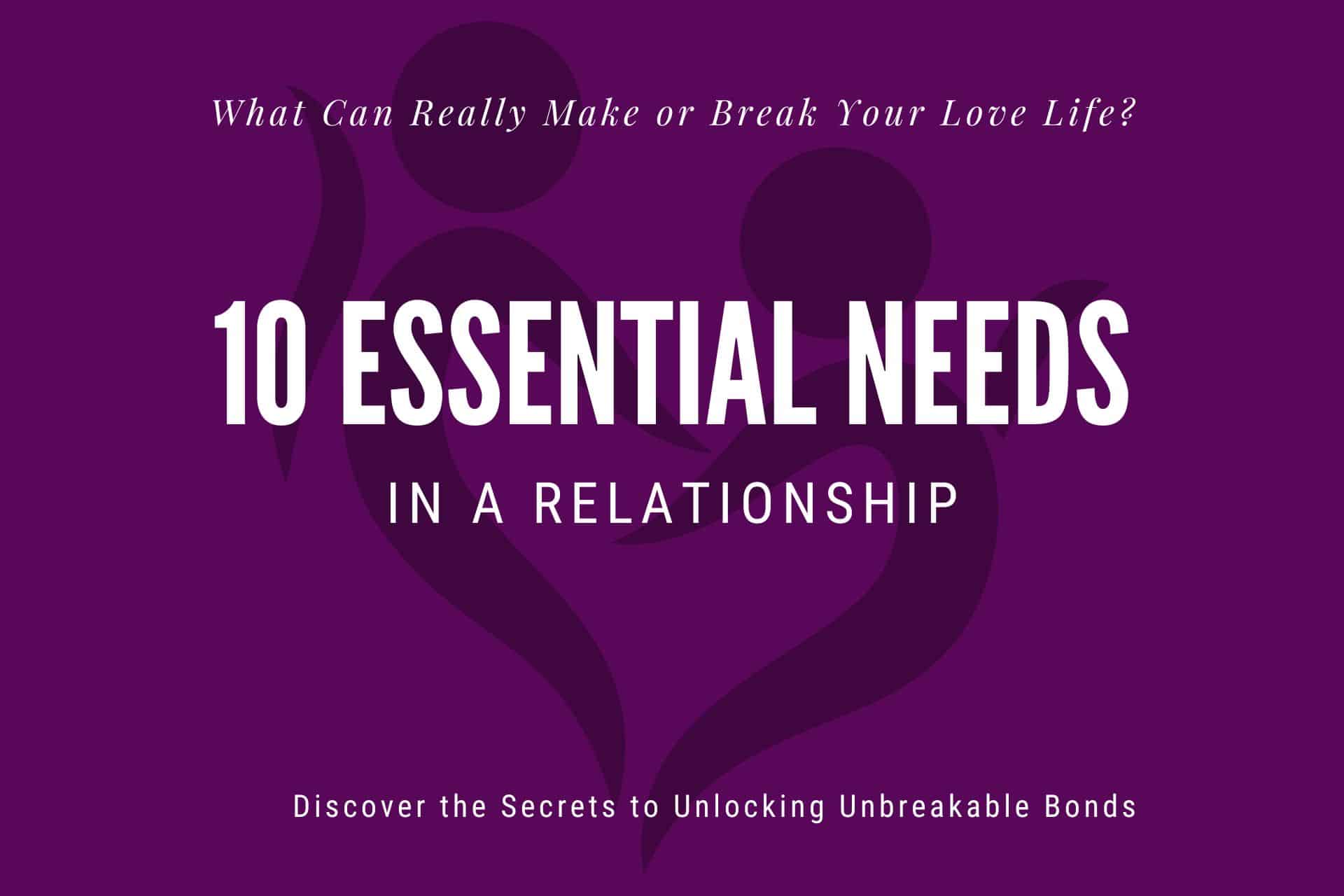Discover the Secrets to Unlocking Unbreakable Bonds
Navigating the nuances of needs in a relationship can often feel like a journey through uncharted territory. It’s a path filled with questions and uncertainties:
What exactly does my partner need? How can I express my own needs without conflict?
Rest assured, you’re not alone in this quest. We understand the complexities and subtle intricacies that come with aligning two lives. With our expertise in relationship dynamics, we’re here to gently guide you towards understanding and fulfilling these vital needs, enhancing your bond.
Our insights are drawn from real experiences and backed by research, offering you a trustworthy compass in the realm of love and partnership.
So, stay with us as we explore together the essential elements that nourish and sustain a relationship, ensuring you’re well-equipped for this important aspect of your journey together.
Let’s get started!
Here's What You Will Find

Key Takeaways
Needs in a Relationship
Recognizing Needs is Crucial: Understanding the specific needs in a relationship is the first step towards a stronger bond.
Effective Communication is Key: Regular and open communication is essential for expressing and understanding each other’s needs.
Adaptability to Change: Be open to evolving needs over time and adapt accordingly for a sustained relationship.
Seek Help When Needed: Don’t hesitate to seek external support like couples therapy if you struggle to meet each other’s needs.
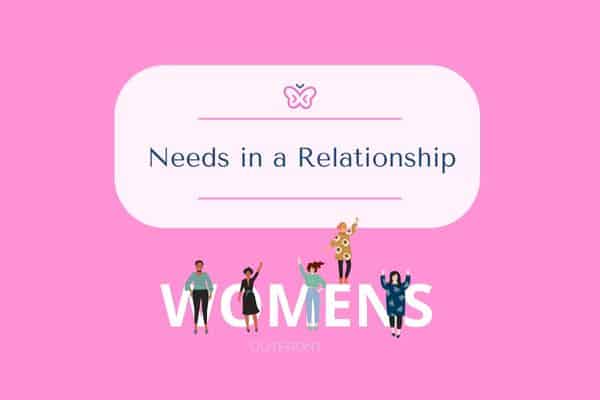
The Role of Needs in Relationships
Decoding the Essentials
The term needs in a relationship might conjure images of romance and companionship, but it encompasses much more. These needs are the non-negotiable elements essential for a relationship’s health and longevity. They are the oxygen that keeps the relationship alive, different from the ‘wants,’ which are more about preferences and desires.
Understanding these needs is the first step toward a fulfilling relationship. But it’s not always straightforward. What one person views as a fundamental need might be less critical to another. This is where the beauty and complexity of human relationships lie. For instance, while one partner might prioritize emotional support, the other might value physical intimacy or shared activities more.
The crux of identifying and meeting these needs lies in communication. It’s a two-way street where expressing one’s own needs and understanding the partner’s needs are equally important. Misunderstandings and unmet expectations often stem from poor communication. Imagine a scenario where one partner craves more quality time but doesn’t articulate this need. The other partner, unaware, continues with their routine, leading to feelings of neglect and resentment in the relationship.
Real-life examples abound where unmet needs have led to issues. Take the case of Maya and Alex. Maya needed frequent verbal affirmations of love, which Alex, being more reserved, struggled to provide. This led to Maya feeling unloved and Alex feeling pressured, creating a rift. It was only through open communication and understanding of each other’s needs that they could bridge this gap.
Exploring the Spectrum of Needs in a Relationship
Relationships are intricate mosaics of various needs, each piece essential in creating a harmonious picture. Understanding the types of needs in a relationship is key to maintaining its health and vibrancy.
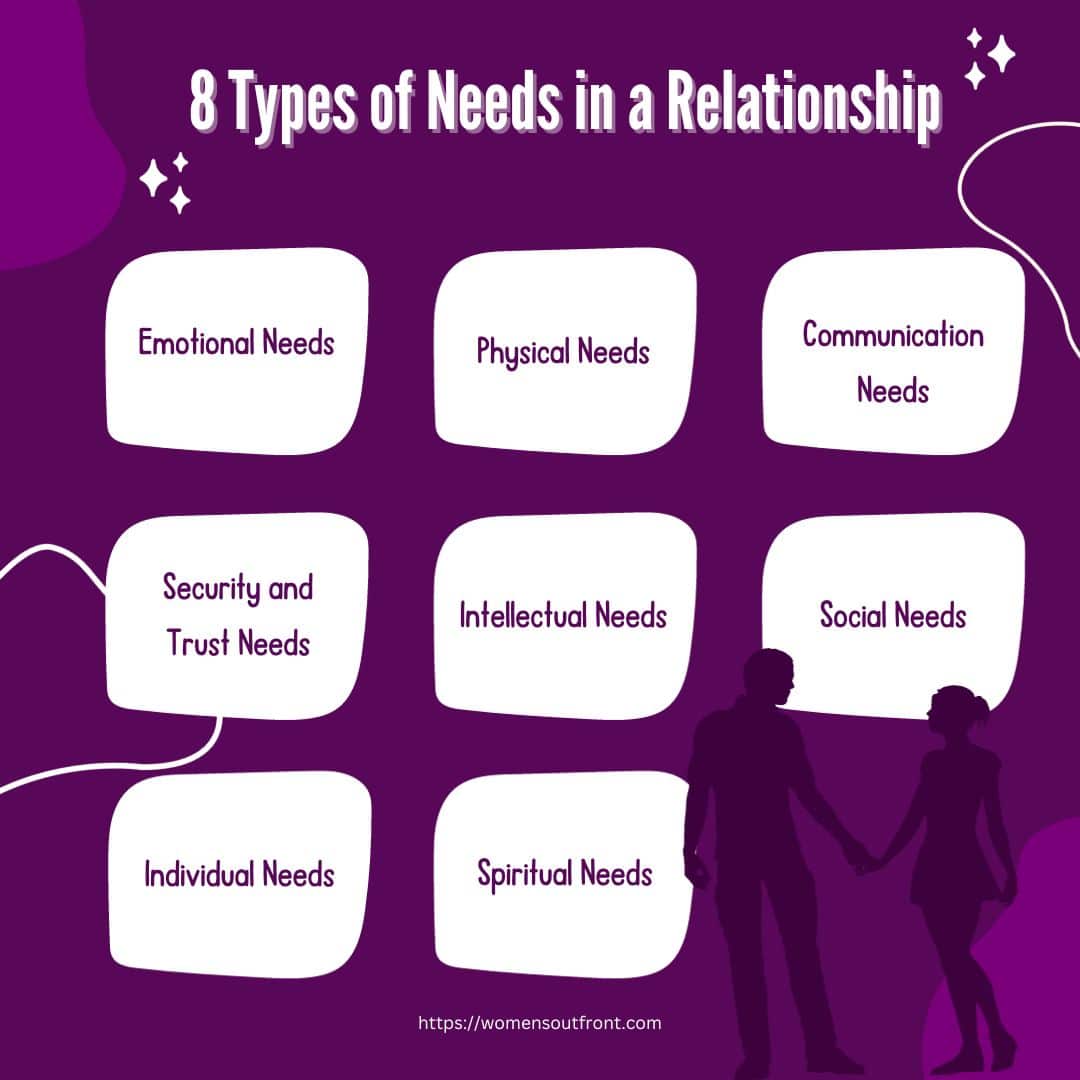
These needs, while diverse, can generally be categorized into several core types, each playing a unique role in the relationship’s dynamics.
Emotional Needs
Every relationship’s heart is the need for emotional connection and support. This includes the need for love, affection, empathy, and understanding. It’s about feeling valued, heard, and emotionally safe with your partner. Emotional needs also encompass the desire for validation, appreciation, and feeling desired.
Physical Needs
These needs are not just limited to sexual intimacy but include all forms of physical closeness, such as cuddling, holding hands, and gentle touches. Physical affection is a powerful non-verbal communication that conveys love and affection and is essential for maintaining a strong emotional connection.
Communication Needs
Effective communication is the lifeline of any relationship. This need encompasses the desire for open, honest, and transparent dialogue. It’s about feeling comfortable expressing thoughts, feelings, and concerns and being heard and understood.
Security and Trust Needs
These needs form the foundation of any strong relationship. Security in a relationship means feeling safe and stable, not just physically but also emotionally. Conversely, trust is about trusting your partner’s loyalty, honesty, and reliability.
Intellectual Needs
This refers to the need for mental stimulation and growth. It can be met through engaging conversations, shared interests, and activities that challenge the mind. This aspect of a relationship is important for keeping things interesting and stimulating.
Social Needs
These needs encompass the desire to have a social life both within and outside the relationship. It includes the need for friendships, social interactions, and shared social activities. It’s about feeling connected to a community and having a sense of belonging.
Individual Needs
While relationships are about togetherness, individual needs must also be respected. This includes personal space, time alone, and the freedom to pursue personal interests and hobbies. Respecting these needs is crucial for maintaining a healthy balance in the relationship.
Spiritual Needs
For some, this might include shared religious beliefs or practices. For others, it could be more about shared values and ethics or a mutual understanding of life’s deeper meanings.
Understanding and acknowledging these diverse needs can help partners support each other more effectively, leading to a more fulfilling and balanced relationship. It’s important to remember that these needs can vary greatly from person to person and can evolve over time. Open communication about these needs must ensure they are met and respected.
10 Essential Needs in a Relationship
Unraveling What Truly Matters for Lasting Love
Understanding the core needs that sustain a relationship is vital in seeking lasting love. While every relationship has its unique melody, there are universal needs that serve as the foundation of a healthy, enduring partnership.
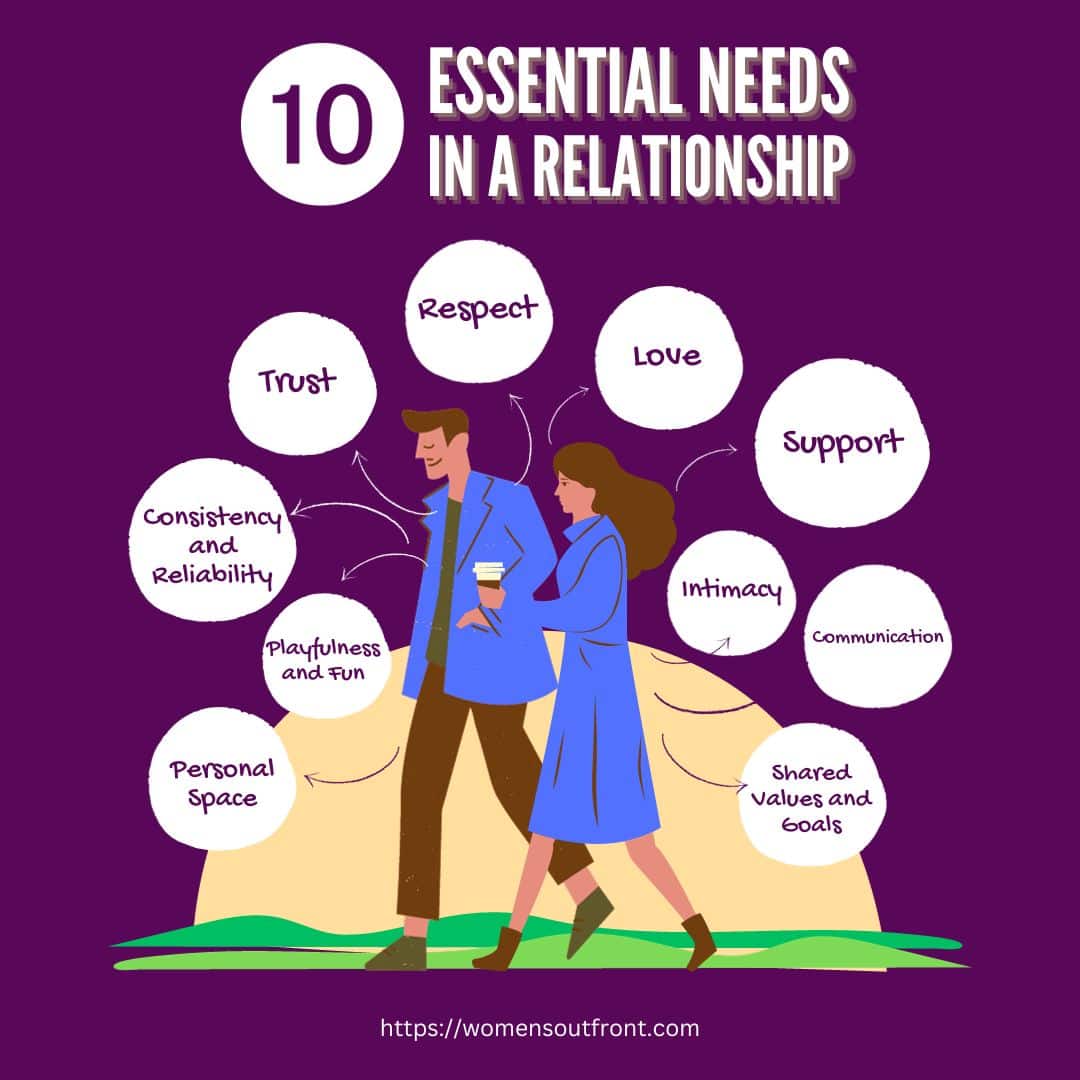
Here, we explore these ten core needs in a relationship that is instrumental in nurturing and strengthening the bond between partners. From the bedrock of trust and respect to the joy of shared laughter, this comprehensive list of needs in a relationship illuminates what truly matters in the journey of love.
1. Trust
The cornerstone of any relationship, trust, involves more than just believing your partner will be faithful. It encompasses trust in their decisions, their words, and their actions. It’s about feeling secure not just in their presence but also in their absence. When trust is present, partners can navigate life’s challenges with confidence in each other. On the other hand, a lack of trust can create a breeding ground for jealousy, anxiety, and conflict, undermining the relationship’s foundation.
2. Respect
Respect in a relationship is about more than just polite behavior. It involves valuing each other’s opinions, feelings, and needs, even when they differ from your own. It’s a mutual understanding that each partner’s perspective and experiences are valid and important. This mutual respect creates a safe and supportive environment where both partners can thrive.
3. Love
Love goes beyond the butterflies of the initial attraction. In a relationship, it transforms into deep-seated care, affection, and a sense of belonging. It’s a multifaceted emotion encompassing empathy, compassion, and a willingness to put your partner’s happiness alongside your own. In its truest form, love is a powerful glue that holds the relationship together through thick and thin.
4. Support
Being each other’s cheerleaders is crucial to a strong relationship. Support means being there for your partner during both their triumphs and trials. It involves offering encouragement, being a sounding board, and providing a shoulder to lean on. This reciprocal support strengthens the bond and fosters a sense of partnership in facing life’s ups and downs.
5. Intimacy
Intimacy extends beyond physical closeness to include emotional intimacy. It’s about sharing vulnerabilities, fears, and dreams. Emotional intimacy is built through open, honest communication and shared experiences, leading to a deeper connection and understanding between partners.
6. Communication
Effective communication is the lifeblood of a healthy relationship. It’s about more than just talking; it’s about conveying your thoughts and feelings in a way that your partner can understand and respond to. It’s also about listening actively and empathically. Through effective communication, misunderstandings can be minimized, and a deeper understanding can be achieved.
7. Shared Values and Goals
Sharing common values and goals brings a sense of unity and direction to a relationship. It’s about aligning fundamental beliefs and life objectives, which provides a framework for making decisions and planning for the future. This shared path fosters a sense of teamwork and partnership.
8. Personal Space
In any healthy relationship, respecting personal space and individuality is as important as togetherness. It’s about understanding that partners need time and space to pursue their interests, hobbies, and friendships. This respect for personal space helps maintain a healthy balance and prevents feelings of suffocation or loss of individuality.
9. Playfulness and Fun
Relationships should be a source of joy and laughter. Keeping the connection light and playful helps relieve stress and builds a stronger bond. It’s about finding joy in the small moments, being silly together, and not taking life too seriously all the time.
10. Consistency and Reliability
Knowing that you can count on your partner adds a vital layer of stability and comfort to the relationship. Consistency in actions and behavior builds trust and shows commitment. Reliability means being there when you say you will be and upholding promises, which is essential for building a secure and trusting relationship.
Meeting these needs is not always instinctive. It requires mindfulness and effort. For example, building trust might mean being more open and vulnerable, while fostering respect could involve actively listening and valuing your partner’s perspective. Intimacy can be nurtured by regular check-ins and sharing personal thoughts and feelings.
Real-life case studies show the impact of meeting these needs. Consider Sarah and Tom, who had differing needs for personal space. Sarah cherished her alone time, while Tom preferred more togetherness. Recognizing and respecting these differing needs helped them find a balance that worked for both, strengthening their relationship.
Mastering the Art of Expressing Needs in a Relationship
Learning how to communicate your needs in a relationship is both an art and a science. It involves more than just speaking your mind; it’s about expressing yourself clearly, respectfully, and conducive to mutual understanding. This crucial skill can transform your relationship dynamics, fostering deeper connections and preventing misunderstandings.
Here, we’ll explore practical strategies to communicate your needs to your partner effectively.
Self-Reflection
Before starting any conversation, it’s important to understand your own needs. Take some time to reflect on what you truly need from your partner and the relationship. Are your needs emotional, physical, or perhaps related to time and attention? A clear understanding of your own needs is the first step in effectively communicating them.
Choose the Right Time
Timing is everything. Avoid mentioning important topics during stressful moments or when your partner is distracted. Instead, choose a calm, relaxed time when both of you are more likely to be receptive and open to discussion.
Use “I” Statements
Start sentences with “I feel” or “I need” rather than “You never” or “You always.” This approach focuses on your feelings and needs without sounding accusatory, which can make your partner defensive.
Be Specific and Clear
Vague statements can be misinterpreted. Be as clear and specific as possible about what you need. For example, instead of saying, “I need more attention,” try, “I would love if we could spend an evening together just talking or watching a movie.”
Listen Actively
Communication is a two-way street. Be ready to listen to your partner’s response or their own needs. Active listening involves making eye contact, nodding, and responding in a way that shows you understand their perspective.
Acknowledge Your Partner’s Efforts
When your partner tries to meet your needs, acknowledge and appreciate it. This positive reinforcement can encourage them to continue being attentive and responsive.
Avoid Criticism and Blameisten Actively
Criticism can escalate into an argument. Focus on your feelings and needs rather than what your partner is doing wrong.
Seek to Understand, Not to Win
The goal is not to ‘win’ the conversation but to reach a deeper understanding and find a solution that works for both of you.
Be Patient and Give Space
Sometimes, your partner might need time to process what you’ve said. Allow them that space without pressing for an immediate response.
Consider Professional Guidance
If communicating your needs becomes particularly challenging, consider seeking help from a relationship counselor. They can provide tools and techniques to improve communication.
Remember, how you communicate your needs can significantly impact your relationship’s health and happiness. It’s not just about making your needs known but about doing so in a way that strengthens your bond.
Balancing Individual and Shared Needs
Finding equilibrium between personal needs and the relationship’s needs is akin to a dance – it requires harmony, understanding, and, sometimes, stepping on each other’s toes to get the rhythm right. Relationships thrive when there’s a healthy balance between individuality and togetherness. This balance ensures that individuals do not lose their essence while the relationship grows.
Consider the dynamics of individual growth and nurturing the relationship as two sides of the same coin. Partners need to grow together, but equally important to grow as individuals. This might mean pursuing personal hobbies, spending time with friends separately, or focusing on individual career goals.
For instance, Anna and Mark found their relationship flourishing when they supported each other’s individual goals – Anna’s pursuit of a PhD and Mark’s passion for mountain biking.
Striking this balance often involves negotiating and compromising without losing sight of one’s own needs or the health of the relationship. It’s about setting healthy boundaries, understanding, and respecting each other’s limits. A practical example is how Emily and John managed their time – allocating weekends for a couple of activities while keeping weekday evenings for personal pursuits.
Real-life scenarios show the importance of this balance. Consider Rachel and Leo, who initially struggled with balancing their need for independence with their relationship’s needs. Through open communication and mutual respect, they devised a plan that allowed for both personal space and quality time together, leading to a more robust and happier relationship.
Challenges in Meeting Relationship Needs
Meeting relationship needs isn’t always smooth sailing. There are common challenges that couples face, each requiring its unique approach and solution.
Communication Barriers
Misunderstandings or lack of effective communication can lead to unmet needs. Overcoming this involves actively working on communication skills and creating a safe space for open dialogue.
Differing Needs
Partners may have different priorities or needs. This challenge can be tackled through understanding, empathy, and compromise.
Life Transitions
Major life events like parenthood, career changes, or health issues can shift relationship dynamics, affecting how needs are met. Adaptability and support are key in such situations.
Unresolved Conflicts
If not resolved, past conflicts can hinder fulfilling current needs. Addressing these through counseling or mediation can be beneficial.
External Pressures
Stress from external sources like work or family can impact a relationship. Finding ways to manage these stresses individually and as a couple is crucial.
Practical solutions include setting aside regular time for check-ins, attending couples’ therapy for deeper issues, and actively practicing empathy and understanding. For example, when Emma and Luke faced challenges due to Emma’s demanding job, they scheduled weekly ‘us’ time to ensure they stayed connected.
Real-life examples can be insightful here. Take the case of Nora and Ethan, who struggled with differing intimacy needs. They learned to understand and respect each other’s perspectives through counseling and open communication, leading to a more satisfying relationship.
The Benefits of Effectively Meeting Needs in a Relationship
Actively fulfilling each other’s needs in a relationship opens the door to many benefits, creating a stronger, more harmonious bond. Here are some key benefits:
Strengthening of the Emotional Bond
Meeting each other’s needs deepens the connection, making partners feel valued and understood, thus enhancing the sense of trust and security. Maya and Liam, for instance, found their relationship growing stronger as they regularly shared their feelings and concerns.
Improved Communication
Addressing needs within the relationship cultivates better communication skills. This leads to more transparency and efficiency in resolving issues, minimizing misunderstandings and conflicts. Partners who engage in this open dialogue often see a significant improvement in their relationship dynamics.
Increased Emotional Security
Caring for and understanding each other’s needs leads to greater emotional security. This boosts confidence in the relationship and supports individual aspirations and goals. The story of Sarah and Jack illustrates this well, as their mutual support in career ambitions enhanced both their personal success and their bond.
Long-Lasting Happiness and Satisfaction
When partners feel that their needs are being met, it results in a more content and stable relationship, reducing the urge to seek fulfillment elsewhere. Emily and Tom’s experience is a testament to this, where their dedication to understanding and meeting each other’s needs brought them a level of joy and fulfillment they hadn’t previously experienced.
These aspects highlight the transformative power of meeting needs in a relationship, turning it into a source of strength, comfort, and enduring happiness.
Navigating the Shifts in Relationship Needs Over Time
Evolving Together
In long-term relationships, it’s natural for needs to evolve. What was important in the early stages of a relationship might change as partners grow and circumstances shift. Recognizing and adapting to these changing needs is crucial for the sustainability of the relationship.
Understanding that change is a part of life and, hence, a part of any relationship is key. For instance, the birth of a child, a new job, or even aging can alter what partners need from each other. Open communication about these changes is vital. Partners should regularly check in with each other to discuss their evolving needs and how they can support each other through these changes.
For example, when Clara and Mike became parents, their need for personal time and sleep became paramount. By acknowledging this change and rearranging their routines to ensure they both got what they needed, they maintained a healthy and supportive relationship amidst the new challenges.
Continuous communication and adaptation strategies can include scheduled check-ins, being open to seeking external help like couple’s therapy, and being patient and empathetic as both partners navigate these changes.
Real-life examples of couples who successfully navigated changing needs can be both insightful and inspiring. Consider the story of Helen and Joe, who, after retiring, found their daily routines and needs dramatically altered. By embracing these changes and finding new activities to enjoy together, they adapted to their new lifestyle and discovered new joys in their relationship.
The Science Behind Relationship Needs
Science and research have provided insightful perspectives on the importance and impact of needs in relationships.
Here’s a summary of key findings:
Research indicates that everyone needs at least one solid relationship where they feel they can count on someone in times of need. This need for dependable relationships is fundamental for the well-being of Harvard Gazette.
A systematic review focusing on adolescence and emerging adulthood found that romantic relationships play a key role in development and can be a significant source of well-being. The review emphasizes the importance of romantic relationships in promoting the well-being of young people PubMed.
Research indicates that there are a set of universal needs in relationships, including companionship, affection (verbal and physical), and emotional support. Strong couples can fulfill these needs within the partnership, while individuals not in a partnership often have these needs met through strong bonds with friends and family. People have varying levels of these needs, often influenced by early relationship experiences Psychology Today.
These findings highlight the significant role of relationships in overall well-being and health, emphasizing the importance of fulfilling relationship needs for a happier and healthier life.
FAQs
How can we effectively communicate our needs without causing conflict?
The key lies in the approach. Use ‘I’ statements to express your feelings and needs without blaming your partner. Practice active listening, where you truly hear and try to understand your partner’s perspective. Timing is also crucial – choose a calm moment when both of you are more receptive to discussion.
What if my partner and I have drastically different needs?
Differences in needs are common in relationships. The solution often involves finding a middle ground through compromise and empathy. Understanding and respecting each other’s needs can strengthen your bond even if they differ from yours. If needed, seek the help of a relationship counselor for guidance.
How can we maintain our individuality while meeting the relationship’s needs?
It’s important to strike a balance. Allocate time for individual interests and personal growth while also dedicating time to nurturing the relationship. Communicate openly about your need for personal space and respect your partner’s individuality as well.
Can needs in a relationship change over time, and how do we adapt?
Yes, needs can evolve with time and life changes. Regular communication is vital to understand and adapt to these changing needs. Be open to renegotiating the terms of your relationship as you both grow, and your circumstances change.
What should we do if our attempts to meet each other’s needs aren’t working?
If you’re struggling despite your efforts, it might be helpful to seek external support. Couples therapy can provide valuable insights and strategies to understand better and meet each other’s needs. Remember, seeking help is a sign of strength, not weakness.
Embracing the Journey of Fulfilling Relationship Needs
Understanding and fulfilling the needs of a relationship is a dynamic and ongoing process. It requires empathy, communication, and a willingness to adapt to changes. By recognizing and addressing these needs, couples can build a strong foundation of trust, respect, and mutual understanding. This journey might not always be easy, but the rewards of a deeper, more fulfilling partnership are well worth the effort.
Remember, every relationship is unique, and what works for one couple may not work for another. The key is to stay connected, be open to learning, and grow together. If you’ve found this article helpful, consider sharing it with other women who might be navigating similar relationship dynamics. And remember, we’re here to support you in your journey toward a healthier, happier relationship.
More on Needs
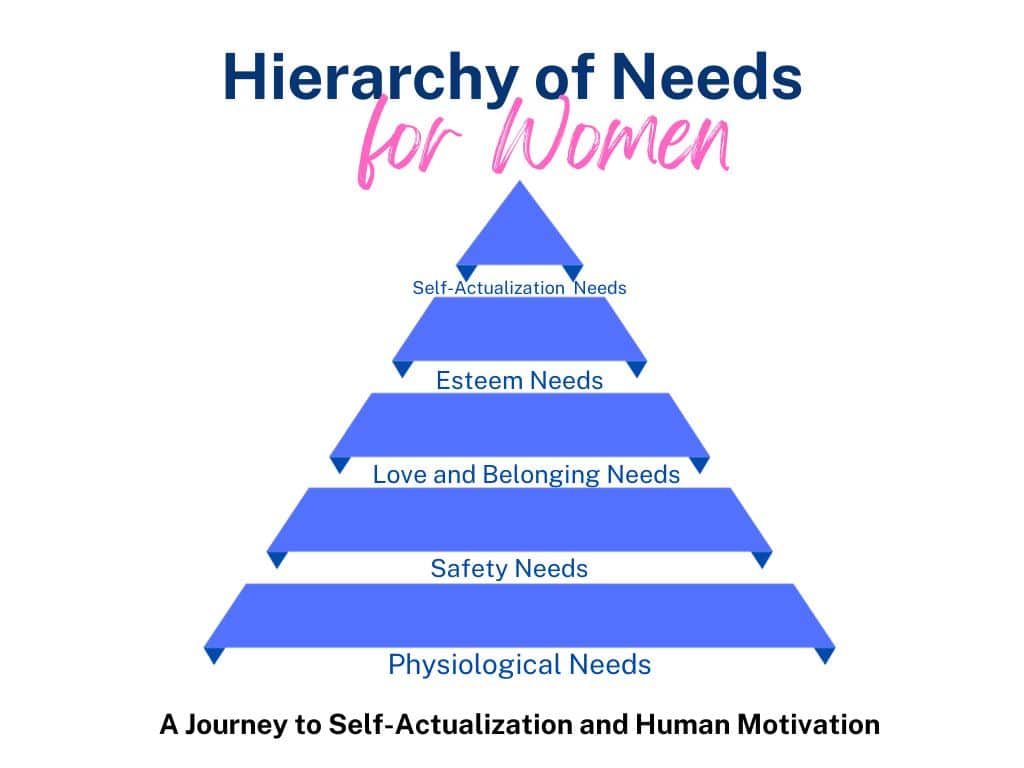
Empowering Women Through Understanding the Hierarchy of Needs

50-30-20 Rule Revealed: Budget Like a Pro and Save More!

Wants vs Needs: Mastering the Art of Smart Decision-Making
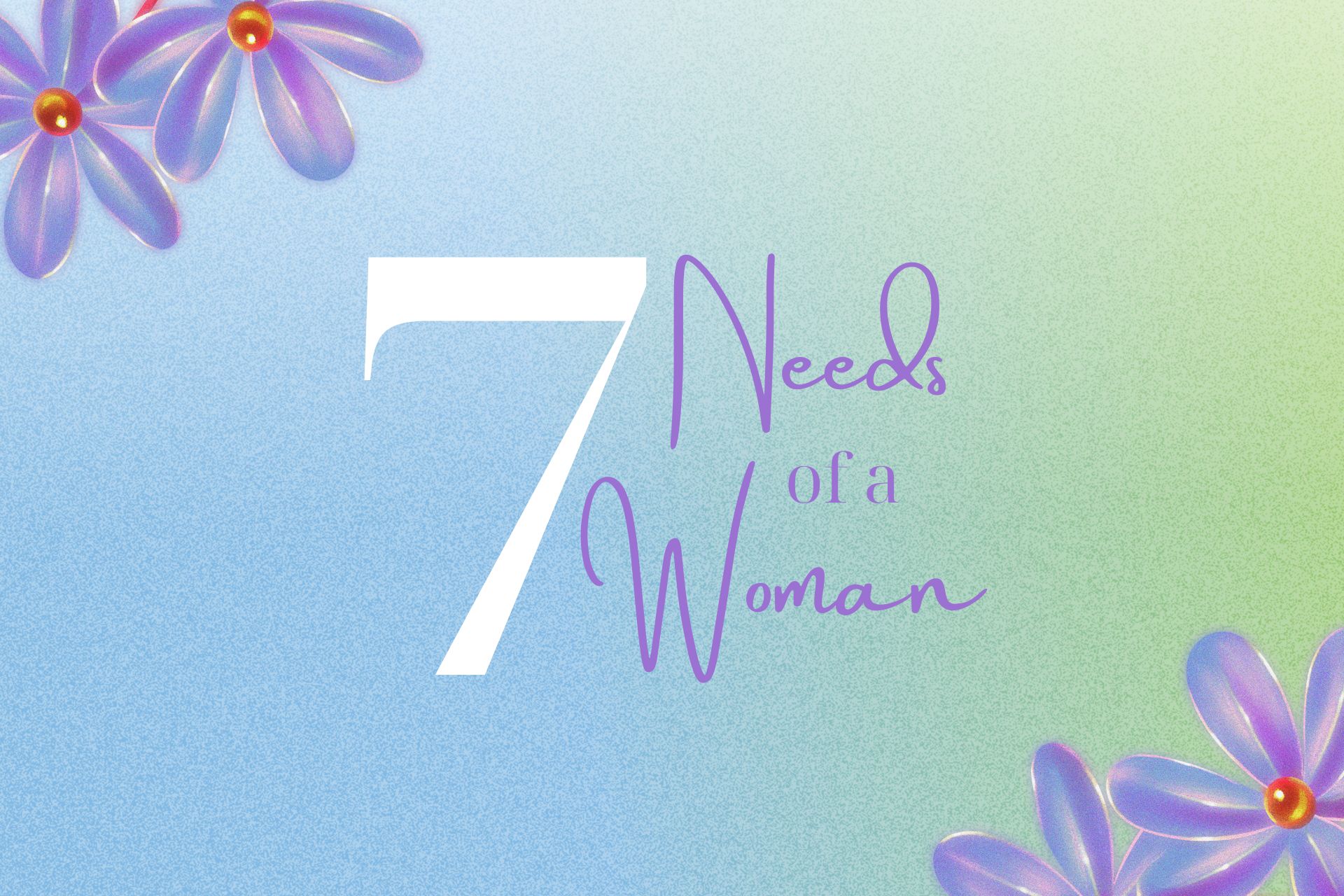
7 Basic Needs of a Woman You Need to Know and Not Ignore!
Related Articles
Resilience in Personal Relationships: 5 Surprising Ways It Can Reignite Your Love Life
Life Partner vs. Long-Term Relationship: 10 Shocking Differences You Need to Know!
How to Find a Life Partner in 30 Days: The Love Hack Everyone Is Talking About!
A Platonic Life Partnership: How to Have Your Cake and Eat It Too—Without the Drama!
Life Partner or Life Sentence? How to Make the Right Choice



